The content of this newsletter
Introduction
Need to know
Strengthening SAI capacity to safeguard natural resource governance
WGEI attends Results Consolidation Workshop for OLACEFs’ Coordinated Audit on Governance Structures for the Integral Management of Mining Environmental Liabilities
WGEI participated in webinar hosted by Revenue Development Foundation on EI data integration
Training Courses
International Training Programme on Audit of Extractive Industries
Introduction
Welcome to the eighteenth edition of the WGEI newsletter! In this edition of the newsletter, you can read about Strengthening SAI capacity to safeguard natural resource governance, WGEI attends Results Consolidation Workshop for OLACEFs’ Coordinated Audit on Governance Structures for the Integral Management of Mining Environmental Liabilities, WGEI participated in webinar hosted by Revenue Development Foundation on EI data integration and International Training Programme on Audit of Extractive Industries.
Have a nice read!
Need to know
Strengthening SAI capacity to safeguard Natural Resource Governance(By AFROSAI-E and SAI Netherlands)
About 3.5 billion people live in countries rich in oil, gas or minerals. With good governance and transparent management, the revenues from extractive industries can have an impact on reducing poverty and boosting shared prosperity, while respecting community needs and the environment.[1] Historically, however, the extractive industries have often contributed to many of the challenges that the sustainable development goals (SDGs) are trying to address such as environmental degradation, displacement of populations, conflict, corruption and the violation of human rights.
In the spririt of INTOSAI-P12 on the Value and Benefit of SAIs – making a difference in the lives of citizens, SAIs are in a position to keep governments accountable for spending state resources responsibly through our audits and related services. Given the grave implications of poorly governed extractive industries for our citizens and the environment, this is an area where SAIs have a significant role to play.
In the sector of petroleum exploration and production, traditional audits are important but not sufficient. If we want to establish whether a government effectively protects its share of the revenues, we need to go beyond. Therefore a system-oriented performance audit is of significant value.
The Netherlands Court of Audit (NCA) in cooperation with AFROSAI-E and funded by the Netherlands Ministry of Foreign Affairs, developed an online course, How to audit government’s performance in managing oil and gas contracts, which builds on the insights from a regional cooperation project (2018-2021) involving the Supreme Audit Institutions of Kenya (OAG), Mozambique (TA) and Tanzania (NAOT). The course enables auditors to critically look at how to audit government’s performance in managing oil and gas contracts (particularly Production Sharing Agreements).
AFROSAI-E launched the course on its learning platform last year and it is available in English, French and Arabic to auditors from all SAIs globally. SAI auditors from countries that are exploring and producing oil and gas will greatly benefit from completing this free course.
Learners from 128 SAIs around the world have already accessed this course since it’s launch in June 2020. Learners who have already completed the course commented that it enables auditors to gain valuable insight on:
- The reason why system-oriented approach to performance audits is applicable for oil exploration and production
- Who participates in the audit process
- The importance of monitoring costs
- The characteristics of the proper functioning of the monitoring and accountability system
- Understand how to formulate the objective of a system-oriented performance audit in cost monitoring
- Develop audit questions using the input and output model as a tool
- Identify sources of audit criteria to evaluate the effectiveness of government cost monitoring
- Examples of solid audit evidence to back up your findings
- Certain specific problems in an audit on oil exploration and production
Another valuable aspect of the course learners commented on is the practical applications and real-world examples from Mozambique, Kenya and Tanzania on how to audit government performance in managing oil and gas contracts.
Another ALP learner noted that “Although my country does not use PSC, the system-oriented performance audit is particularly useful and the clear approach can be applied in other government contracts. I now have a very thorough knowledge of the sector that can help me understand the stakeholders and the processes involved. I specialised in environmental auditing and the system-oriented performance audit can be especially useful in the assessment of government monitoring of environmental and social impact of extractive industries.” – ALP learner
We want to encourage SAIs and individuals to include the online course: How to audit government’s performance in managing oil and gas contracts on their SAI-level and individual training plans. The four modules of the course only take an hour to complete. Learners who complete the course in full, will hence forth earn a certificate of completion.
To access the course, go to the AFROSAI-E Learning Platform (ALP) at www.afrosai-e-learning.com, register a profile and upon receiving the approval (this can take up to 48hrs) enrol for the course on ALP. If you have any questions on the registration process, refer to our Frequently Asked Questions section on the ALP page.
[1] https://www.worldbank.org/en/topic/extractiveindustries
WGEI attends Results Consolidation Workshop for OLACEFs’ Coordinated Audit on Governance Structures for the Integral Management of Mining Environmental Liabilities(By Sheilla Ngira, Coordinator WGEI CoP, SAI Uganda)
WGEI attended a virtual OLACEFS workshop that was held from 27th to 30th April 2021. The workshop was held to consolidate the results of a coordinated audit on Governance Structures for the Integral Management of Mining Environmental Liabilities. The objective of the audit was to evaluate the governance mechanisms that governments have generated for the integral management of Mining Environmental Liabilities (MELs). Execution of the audit was linked to Sustainable Development Goals (SDGs) 12 (Ensure consumption and production patterns) and 15 (Sustainable use of terrestrial ecosystems). All 13 member SAIs of OLACEFS and 2 sub-national entities participated in the audit. The audit was led by the Office of the Comptroller General of the Republic of Chile, in its capacity as the Presidency of the OLACEFS Public Works Working Group (GTOP).
The inaugural ceremony for the consolidation workshop was presided over by Mr. Jorge Bermúdez Soto, the Comptroller General of the Republic of Chile. The workshop attracted participants from SAIs taking part in the audit, representatives from SAI Canada, GIZ, the Working Group on Environmental Audit (WGEA) and WGEI. WGEI was represented by SAIs Zambia, Fiji, South Africa and Uganda. SAI Zambia delivered presentations on the experience of WGEI member SAIs in the area of mining environmental liabilities and a case study of an audit it undertook on mining environmental liabilities and recovery. View here and here.
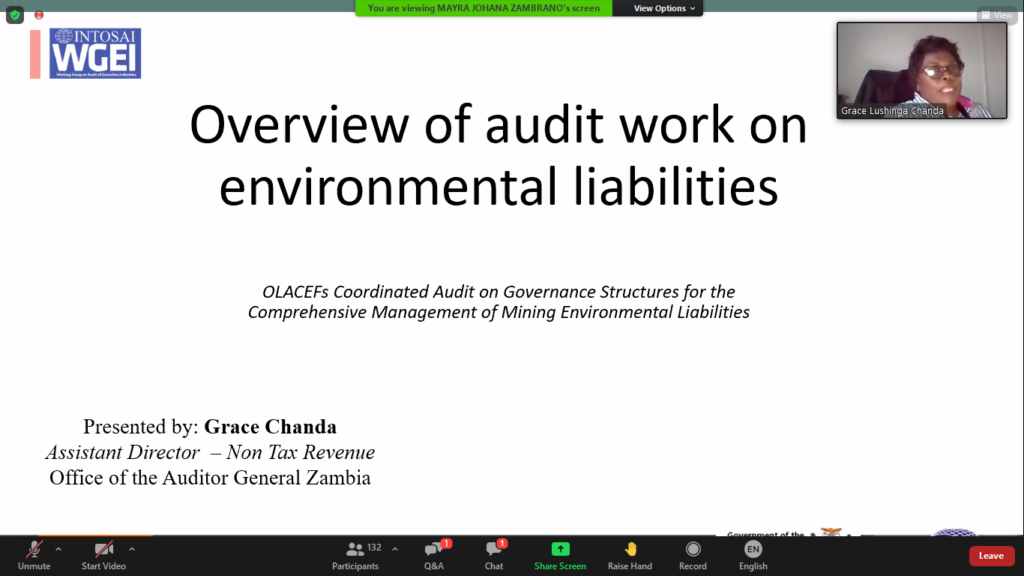
This audit serves as an example of how to undertake coordinated/cooperative audits during times of crises since a lot of work was undertaken in 2020 when the COVID 19 pandemic broke out. In preparation for the audit, 2 webinars and 2 virtual courses were conducted to introduce participants to concepts in mining environmental liabilities and the SDGs. In June 2020 a virtual planning workshop was held. Participating SAIs then executed the audits locally in their respective countries. In April 2021 the SAIs met at a virtual workshop to consolidate the results of the audit.
Key takeaways from the workshop include: a) coordinated/cooperative audit is a useful tool to address issues of general concern/interest across boarders (for example environmental impacts), b) there are limited tools available to analyse the management of mining environmental liabilities, it is therefore important to share different experiences and perspectives in this area in order to forge a way forward, and c) integration of the SDGs into the extractive industries faces a number of challenges that must be addressed. While COVID 19 interfered with their application, suspension of the SDGs is not an option; we have to implement them now.
We await the final report of the coordinated audit.
WGEI participated in webinar hosted by Revenue Development Foundation on EI data integration (By Trygve Christiansen, SAI Norwary)
WGEI was invited to give a presentation on a webinar on 24 March 2021 hosted by the Revenue Development Foundation (RDF). RDF is a foundation which supports governments in developing countries to increase their domestic revenues. RDF has developed software solutions which enable company reporting and government reporting on EI revenue to be automatically reconciled. These solutions fit well into the ongoing process of mainstreaming the EITI reconciliation process. This means that we should move away from yearly costly EITI reports developed by consultancy firms, which act as independent assessors. Instead there should be systems and mechanisms in place in government which ensure continuous sharing of information and data which allow for real time reconciliation.
The software solutions by RDF allow for a shift from manual and resource intensive reconciliation to automatic reconciliation. They are currently being used in a number of EITI countries such as Senegal, Guinea and Ghana with positive results. According to EITI and RDF a natural next step would be to use the SAIs as the de facto independent assessors. The SAI may check the integrity and accuracy of the systems used to generate data, and may integrate this into their regular audit cycle. Mainstreaming would therefore imply that the information provided by the annual EITI reports have been integrated into country systems and reporting, and that there are country mechanisms in place to ensure that the information generated by the systems are correct.
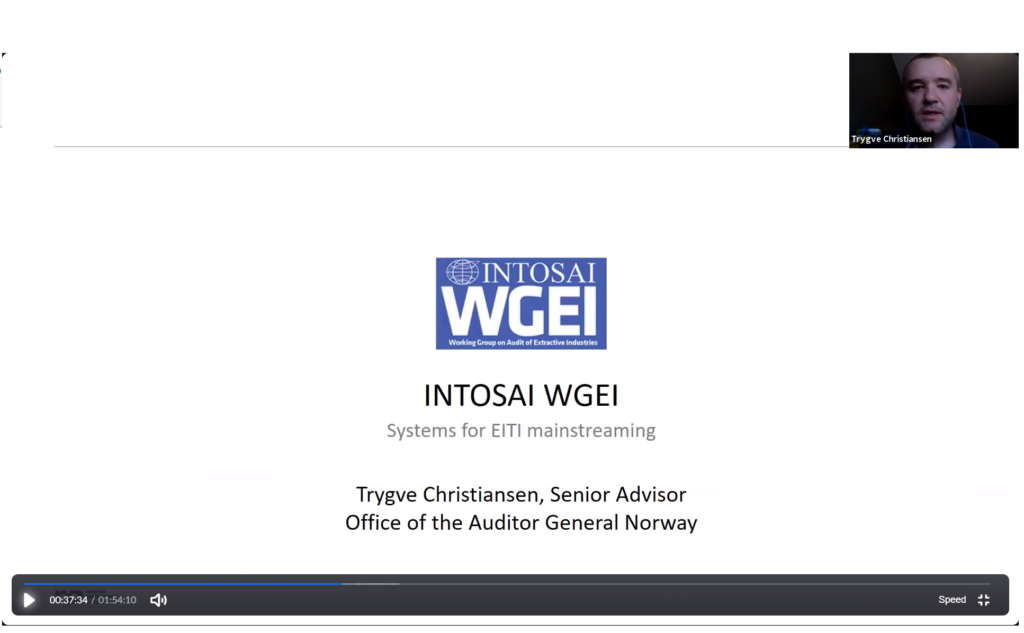
A representative from WGEI OAG Norway was asked to present the role of WGEI and our view on the RDF systems in the EITI mainstreaming process. Our view is that this development is very promising. Too often SAIs’ experience is that government institutions such as the tax authority, petroleum/mining authority, customs, resource ministries etc. work in silos and fail to share important information such as production data, tax revenue received and exported goods. These IT systems force these institutions to share information and allow third-party actors to verify the data. SAIs may audit the systems using different methods, such as IT audit, to ensure that they produce accurate and correct information.
Although it makes sense to allow SAIs fill the role as an independent assessor, it is also important that this does not infringe on the SAIs mandate and let it become overburdened with additional tasks. If this is to be a sustainable solution in the long-term, the audits and checks of the EI reporting systems carried out by the SAI should be based on a normal risk assessment and possibly be integrated into the annual audit plan of the SAI.
The webinar was a good opportunity for marketing the role of WGEI and its important work. The participant list included representatives from civil society organizations, EITI, EI government institutions and donor organization. To learn more about RDF and its work, visit its website: Revenue Development FoundationMobilizing Government Revenue
Training Courses
International Training Programme on Audit of Extractive Industries(By iCED – SAI India)
The International Centre for Environment Audit & Sustainable Development (iCED), Jaipur (India), the Global Training Facility (GTF) of the INTOSAI Working Group on Audit of Extractive Industries (WGEI) organized an International Training Programme on Audit of Extractive Industries (EI) from 15th to 19th March, 2021. The course covered module 1- An Overview of the Extractive Industries and module 8 – Environment and Sustainable Development of Extractive Industries of the EI Training Framework developed by WGEI. A total of 87 participants from 26 countries across the globe attended the programme organized online. The training programme was inaugurated by Ms. Namita Sekhon, Deputy Comptroller and Auditor General, SAI India. Mr. John F. S. Muwanga, the Chair of INTOSAI WGEI and Auditor General of Uganda graced the concluding plenary session.
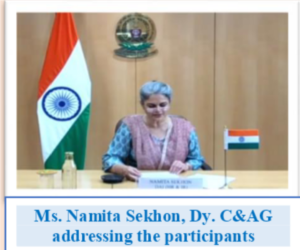 In her inaugural address, Ms. Namita Sekhon emphasized that audit of extractive industries has received increased attention in the recent past. Supreme Audit Institutions (SAls) can contribute to better and more transparent oversight of extractive industries through audit. Thus, they can help to ensure that governments manage natural resources in the best interest of the public.
In her inaugural address, Ms. Namita Sekhon emphasized that audit of extractive industries has received increased attention in the recent past. Supreme Audit Institutions (SAls) can contribute to better and more transparent oversight of extractive industries through audit. Thus, they can help to ensure that governments manage natural resources in the best interest of the public.
During the training, eight experts from SAI Uganda, SAI India and other organizations from India delivered the sessions. The sessions included: introduction to Extractive Industries, Value Chain: Industry and Government Perspective for Petroleum and Mining sector, Key Players and External Stakeholders in the Extractive Industries, the Role of SAls in Extractive Industries, Sustainable Development and sustainability initiatives in Extractive Industries, Environment and Social Issues in Extractive Industries, Management of Environment and Social Impacts of Extractive Industries, Audit of Environment Clearance and Environment Management in Extractive Industries, EITI, Emissions Reporting, Sustainability Reporting and Environment, and Choosing and designing Audit of Extractive Industries from Environment / Sustainability perspectives. View course materials here
This training, the first based on the EI Training Framework developed by WGEI, was well received by the participants who appreciated the opportunity to learn, keep abreast of new developments and network with colleagues in various parts of the world amidst the pandemic.
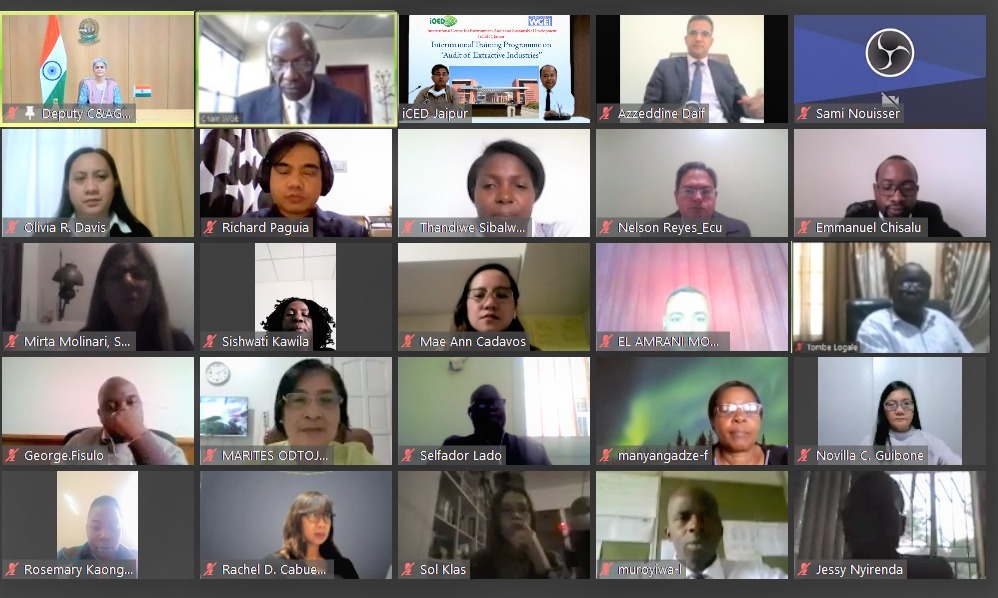
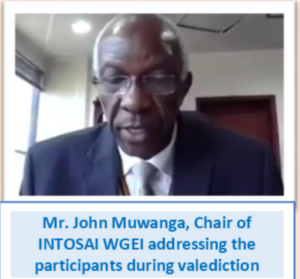 Similar sentiments were echoed by the Chair of WGEI, Mr John F.S. Muwanga, who in his closing remarks at the valediction emphasised that this training provides an EI knowledge base designed to strengthen the capacity of SAls to carry out high quality audits and thereby promote transparency, accountability and good governance in the sector. He also encouraged participants to enrol in subsequent trainings to complete all the modules in order to acquire the complete knowledge needed in the audit of extractive industries.
Similar sentiments were echoed by the Chair of WGEI, Mr John F.S. Muwanga, who in his closing remarks at the valediction emphasised that this training provides an EI knowledge base designed to strengthen the capacity of SAls to carry out high quality audits and thereby promote transparency, accountability and good governance in the sector. He also encouraged participants to enrol in subsequent trainings to complete all the modules in order to acquire the complete knowledge needed in the audit of extractive industries.





